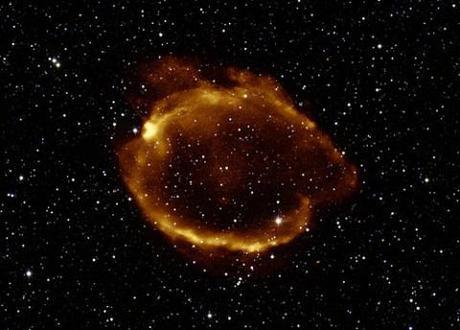
In it's heyday ROSAT helped produce impressive images like this Photo credit: NASA's Marshall Space Flight Center http://flic.kr/p/avGWgi
Oh God, it’s happening again. Just when you thought you were safe, another satellite is on a collision course with earth. Is this the end? Are we all going to be squashed like ants by a shower of flaming metal shards? Probably not.
A retired German satellite, ROSAT, is falling back to earth and is predicted to touchdown somewhere on the globe in the next few days. The satellite, which is, according to The Washington Post, the “size of a minivan”, has been in orbit since 1990, and was originally used to record X-ray images. It is now losing altitude with each successive orbit, and “increased solar radiation activity has enlarged the atmosphere, increasing the friction on the satellite.” This solar and climatic activity, Johann-Dietrich Wörner, executive director of the German lab in charge of the mission, told the New Scientist, has pulled the satellite towards the earth, and soon it will be upon us.
In September, after some considerable worry, the NASA UARS satellite plopped harmlessly into the Pacific Ocean. Should we be more worried this time around?
1.6 tonnes. Although the ROSAT satellite is smaller than the NASA satellite that previously slammed into the sea, it is expected to have greater potential to cause damage. The National Geographic reported that due to the nature of the X-ray equipment onboard, this satellite is very robust, and is fitted with mirrors to shield the components from heat. These mirrors could mean that large sections of the structure remain intact, and a single piece up to 1.6 tonnes in size could hit the ground, while a total of up to 26 pieces could rain down from the skies. Scary stuff.
The risk. Despite the somewhat alarming prospect of a flaming minivan falling from the sky, the experts aren’t particularly worried. The German Aerospace Center said there’s a 1 in 2000 chance that someone will be hit. In the interests of self-preservation, they went on to say, “The probability of someone in Germany being harmed is much lower: about one injury for every 700,000 de-orbit events.” No news of the exact risk in the UK.
Who to blame? If you do get hit, don’t worry. The New Scientist handily pointed out that it could be a blessing in disguise, if you survive: “three nations will have to pay compensation, DLR points out: the US (which launched it), the UK (where the primary payload was made) and Germany (which ran the mission).”
There’s an app for that. While some people are keen to get as far away from the crash as possible (head to the poles of the planet if you’re that concerned), others want to watch. Since the fall will be entirely uncontrolled and largely unpredictable, a new app has been developed, the ROSAT Re-entry App, to keep satellite watchers informed with up to the minute information. In the meantime, keep an eye on the skies, and, over the weekend, if you look up and notice something coming down towards you, duck.

